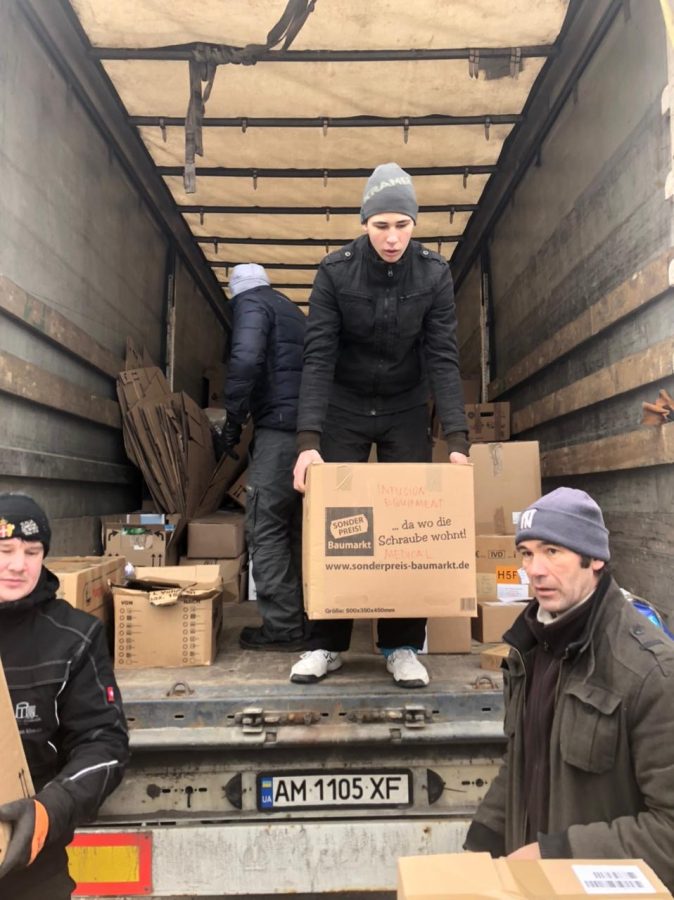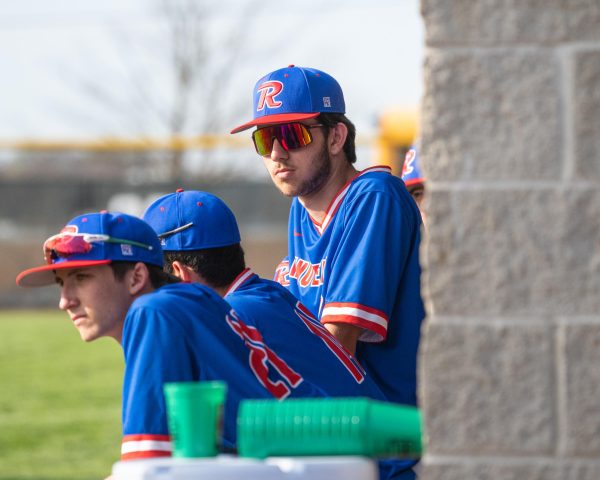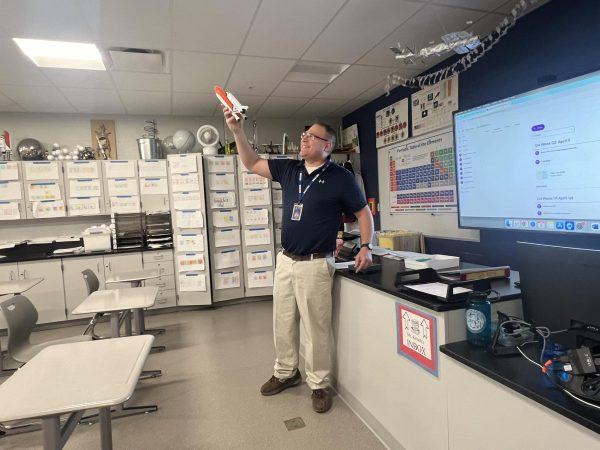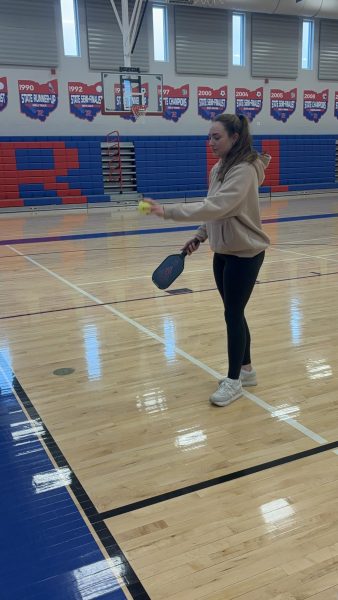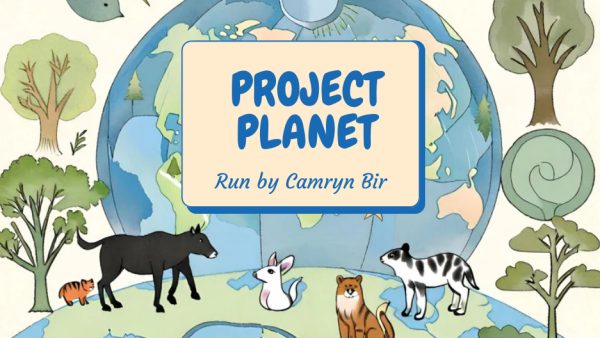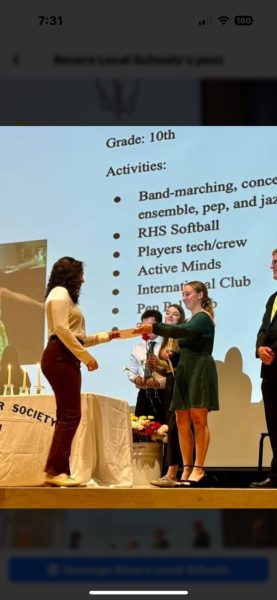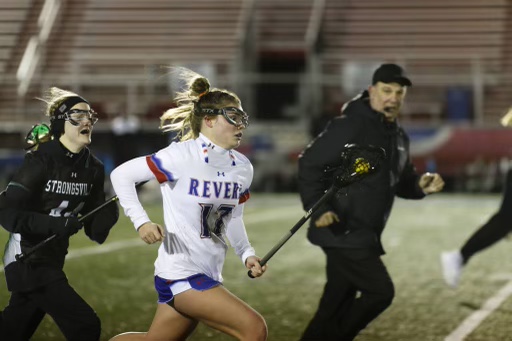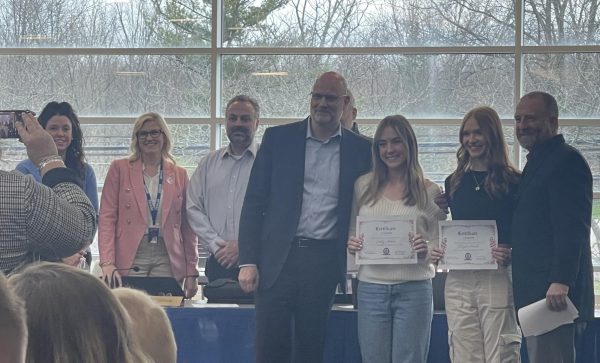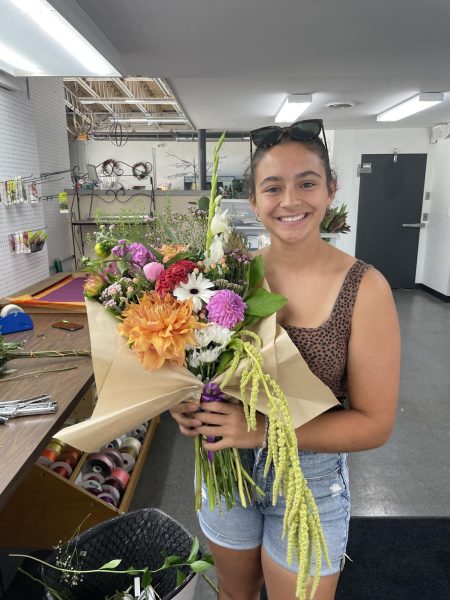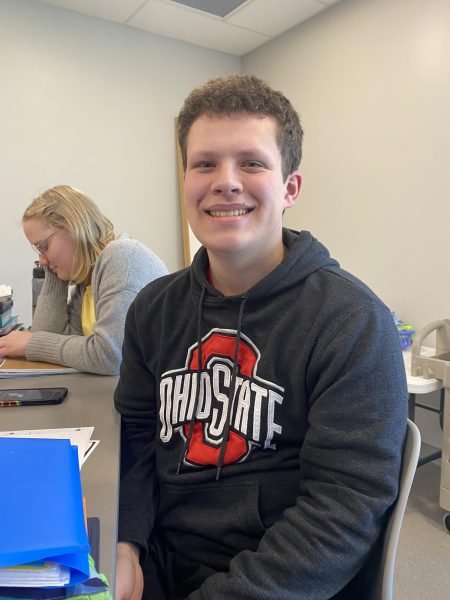Conflict in Ukraine affects Revere community
Used with permission from Carol Kraynak
Joesph and Mariana Stec organize donations to give to refugees in Poland.
Although the air raid sirens, the cries for help and the echoes of the bombs feel worlds away, for two Revere families, the conflict in Ukraine feels close by.
RHS education aide Carol Kraynak and her freshman daughter Tessa are well aware of the horrors taking place across the ocean; they hear the stories from first-hand witnesses. Carol Kraynak’s brother Joseph Stec and his wife Mariana recently fled Ukraine, escaping to Poland where they are now aiding other refugees and are helping control donations going back across the border into Ukraine. Carol Kraynak explained her brother’s story.

“My brother–he is a US citizen–is married to a woman from Ukraine. They live in Irpin, which is a suburb of Kyiv. . . They were living near the capital, and there was some intelligence that a war could take place and that there would be an invasion, so they made plans to fly to Turkey in February,” Kraynak said.
On February 24, 2022, the missile attacks began.
“The morning they were supposed to leave, they started feeling the explosions in their apartment, and the airport was bombed. They could obviously not fly out,” Kraynak said.
Although most Ukrainian men under sixty were mandated to stay back and defend their country, Joseph Stec’s US citizenship put him in a unique spot.
“The men that are under sixty have to stay because they should be helping the war, but because he is a US citizen, that was not the case,” Kraynak said.
Joseph and his wife, unable to follow through with their plans to leave for Turkey, decided to travel to Poland, where they would still be able to directly help with the war and aid the Ukrainian people.
“They escaped to Poland. It took what would usually be a four-hour trip three days because there were many detours they had to take, Russian soldiers that stopped them along the way, that kind of thing. They picked Poland partially because they have pets and Poland allows you to take your pets with [you], but also we have family in Poland as well, and so he is not living with them, but it helps a little bit,” Kraynak said.
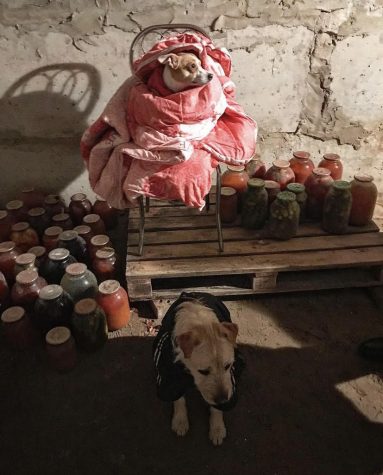
Before the war began, both Stec and his wife worked in Ukraine, but the ongoing war has left his wife Mariana, along with millions of others, jobless. Luckily, Stec was able to transition to a completely remote setting for his job and continue to provide a source of income for the family.
“His wife ran a modeling agency, which got destroyed in the war, and my brother [Stec] works for a data company, so he is able to work remote,” Kraynak said.
Even with Joseph continuing to work, both he and his wife have spent countless hours helping both refugees and those back in Ukraine with the resources he brings in.
“While he works remote, a lot of what they are spending their time doing is buying food for the refugees that came to Poland and aren’t as lucky as them to still be able to work. They are helping soldiers and civilians that have been wounded, finding out what specific kind of gauze they need [and] what kind of medicine they need. And then they’re also sending food back to Ukrainians who are trapped somewhere in Ukraine,” Kraynak said.
According to the reports from IOM (International Organization for Migration) based on surveys from March 9-16, an estimated 12 million people are stranded in Ukraine or unable to leave areas affected by the fighting. Kraynak explained in detail how many of these people ended up stranded in the warzone.
“A lot of people left their homes, but not the country. Imagine if you were told that there is a war, maybe you would just want to go down to Florida or somewhere that still feels like home. But now, even places that were safe, like yesterday Lviv was bombed, and that is in the West, which has always basically been safe,” Kraynak said.
Joseph Stec has lived in Ukraine for the last twelve years. His sister Carol Kraynak explained her family’s relationship to Ukraine.
“My grandpa lived in Ukraine till he was seven. I never learned Ukrainian, but my grandparents spoke it in front of us when they didn’t want us to know what they were talking about. I have never been to Europe, but my brother has always been a traveler, and so he has lived there for the last twelve years,” Kraynak said.
Although the conflict in Ukraine feels new to the media, RMS Social Studies teacher Pete Kramarczuk has long heard about and taught the stories of war in Ukraine.
“My parents were born in Ukraine and immigrated to America in the 1950s. I am a first-generation Ukrainian-American. I still have relatives living there,” Kramarczuk said.
Kramarczuk’s father was living on a farm in Ukraine when it suddenly was overtaken by German Soldiers. An estimated 1.5 million Ukrainian Jews were killed in the attack, with nearly 34,000 killed in just the first two days of the fight. Kramarczuk’s father was saved by American soldiers, inspiring a lasting respect for the American soldiers through generations.
In addition to teaching history to many sixth-grade students, Kramarczuk devotes much of his time to increasing awareness for POW/MIA soldiers. Kramarczuk has donated POW/MIA flags for the school and led efforts to increase recognition of the struggles of veterans. Additionally, Kramarczuk, a licensed pilot, is part of the Veterans Airlift Command, a national network of volunteer aircraft that offers free air transportation for wounded warriors, veterans and their families for medical and other compassionate purposes.
“I volunteered on the VAC missions to pay-it-forward to today’s military veterans. It was their brothers and sisters in WWII that liberated Ukraine from the Germans. My parents were displaced from their ancestral home as a result of the German occupation, and they subsequently immigrated to the US,” Kramarczuk said.
In addition to honoring and thanking American veterans, Kramarczuk has worked to retain a strong connection to his heritage and help those in Ukraine.
“I taught English in western Ukraine three separate summers by way of volunteering on service trips. In 2019, I took a university class on Ukrainian culture and language in Lviv, the cultural capital of Ukraine. On each of my trips, I was able to visit with my relatives and make new friendships,” Kramarczuk said.
Although Kramarczuk is able to incorporate his own experiences into his curriculum, he also focuses on providing an accurate, unbiased perspective on the conflict for his students by utilizing resources specially designed for young people that cover these emotional yet important topics.
“I utilize media material that is objective and geared to the middle school student, such as Time For Kids, to provide factual information when appropriate,” Kramarczuk said.
Although Kramarczuk has studied conflict throughout the entire world, having a war within a place he knows so well brings a new level of emotion. Kramarczuk explains how the war has affected his daily life.
“I find myself watching the news more often, and I am naturally very sensitive to the events in Ukraine. All of it is very upsetting, and it does, without doubt, affect me deeply,” Kramarczuk said.
Kramarczuk continued, expressing his reaction to the war.
“As a Ukrainian Catholic and a man of faith, I am repulsed, sickened and saddened to witness the inhumanity, cruelty and unrestrained barbarism of the invading military,” Kramarczuk said.
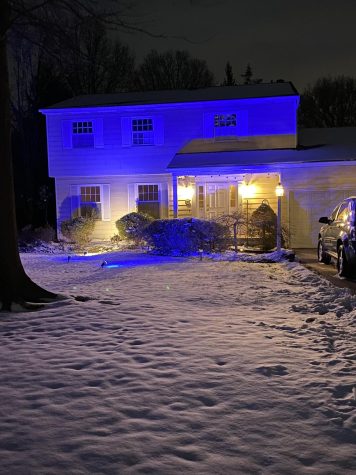
Although the resistance and courage shown by the Ukrainian people amazed many foreigners, Kramarczuk was not surprised by their actions.
“I am proud to be of Ukrainian descent, and I am not surprised at the fortitude and courage shown by the Ukrainians. Ukrainians are freedom-loving and peace-seeking, and what is currently happening in Ukraine to resist the invaders demonstrates their strength of mind and toughness of spirit,” Kramarczuk said.
Although the conflict is over 5,000 miles away, both Kramarczuk and Kraynak noted that there are many ways for the Revere community to support the Ukrainian people.
“For people here, [the first thing to do] is just to create awareness. I was in a class where one of the kids said ‘we should just nuke Kyiv.’ And [RHS Social Studies teacher] Mr. Rahas got really upset because he knew I had family there,” Kraynak said.
One club in particular at RHS has made an effort to bring attention to the situation. On Wednesday, April 20, Students Demand Action (SDA) hosted their annual Middle Ground Event, this year, focusing on US Intervention in Global Conflicts. SDA secretary Sanchita Chandran described the intentions of this event and why they chose to focus on the conflict.
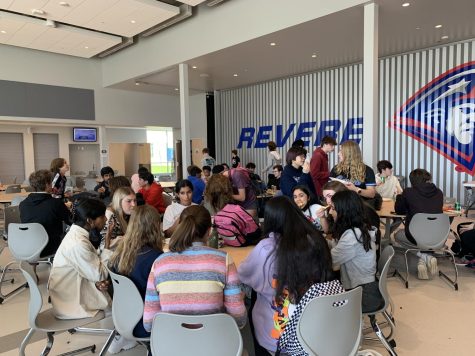
“The middle ground event is intended to bring students across from different political viewpoints to discuss an issue, like Ukraine, and not only discuss it but also gain awareness because that is the best way to form a viewpoint,” Chandran said.
Although, as of April 19, an estimated 15,000 Ukrainians have been killed, many people still do not understand the conflict.
“Just having awareness [is essential]… Some people say ‘Oh, it’s just a white war,’ but this one does affect a lot of people, innocent people that are just having their home invaded,” Kraynak said.
Although many people view the war as simply a tax on gas prices, Kraynak encourages everyone to educate themselves on the conflict and then educate others.
“The second thing is sharing your time. [You] could call congressmen and let them know to support Ukraine. I know the gas prices stink, and people like to talk about that. You could also volunteer at the local Ukrainian churches, who are collecting things and sending them over,” Kraynak said.
Having discussions about global conflict can help inform and educate all.
“One of my daughter’s friends is a Russian Studies major at Ohio State, so they’ve had a lot of discussion about what is going on there,” Kraynak said.
Both Kraynak and Kramarczuk believe keeping Ukraine and the stories of those within it alive is essential to helping the war effort.
“I would say, first and foremost, pray. Regardless of religious affiliation, prayer works. Little kids, adults and big kids can all pray. And, it really matters,” Kramarczuk said.
Thoughts and prayers can help show support to and succor the people of Ukraine.
“If you are a believer, pray for them. I know it brings a lot of peace to people to know they are cared about in that way. I have one daughter who went to a parade of support in Chicago that had lots of Ukrainian people there,” Kraynak said.
Additionally, monetary donations or collections through acclaimed organizations can directly help the effort, although Kramarczuk warned against donating to unfamiliar organizations.
“I feel that any donations/collections should only be made through vetted organizations such as the International Red Cross or through Ukrainian churches, such as St. Josaphat Ukrainian Catholic Eparchy in Parma,” Kramarczuk said.
Although the true Red Cross Organization works to aid those in need, Kraynak and Stec worry about fake organizations taking advantage of places like the Red Cross’ notoriety.
“Of course, donating money. . . I would say a credible organization. The Red Cross [is common]. My brother would say that one is so-so because the Russians were putting Red Cross things on some of their things and it was actually battle things, which you aren’t allowed to do and is considered a war crime. . . Anyway, they’ve had some issues,” Kraynak said.
According to the Red Cross and other organizations, donations will go towards distributing food, water, clothing, bedding, hygiene sets, blankets and even handing out SIM cards so that families can stay connected amid the turmoil. Additionally, both physiological and physical medical care will be available directly on the border.
“Donating to any vetted charitable organization(s) with direct connections to Ukraine is the best way to support Ukraine,” Kramarczuk said.
Stec recommends using the website how to help Ukraine to find reliable organizations.
“There is a site my brother sent me that is real ways you can help Ukraine, and if you go to the US, it gives you places you could donate to such as Doctors Without Borders,” Kraynak said.
Even if monetary donations are not feasible, Kramarczuk recommends finding a way for each citizen to help the Ukrainian people.
“Anything that any student or community member can do to support Ukraine is invaluable,” Kramarczuk said.
Kraynak recommends getting creative and finding your own way to support the war effort.
“Use your own passions and gifts. I have one daughter who is an artist, so she will create artwork to make awareness, and also some people are selling things for money. I know there is an artist in Cleveland who takes pictures of Terminal Tower lit up yellow and blue and is using the money for Ukraine,” Kraynak said.
Kraynak provided ideas for more ways to help support Ukraine.
“A student at my one daughter’s school made wreaths and sold them for money, so you can use whatever talents you have. When my daughters were in sixth grade and Crimea was being taken over, they sold bracelets just to be able to send money there. Just use whatever talent someone has. Write to your congressmen or write a poem,” Kraynak said.
For many high school students, a valuable resource is at their fingertips: social media.
“You can post things on your social media. You can create art. You can donate money or time, those kinds of things are things students could do here,” Kraynak said.
Although Joseph and Marina Stec are safe in Warsaw, Poland, the war still continues today, affecting millions. To donate, please check out the provided resources.

